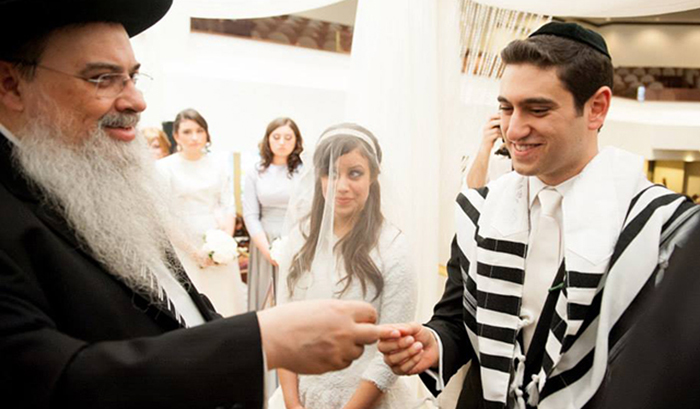Dateline Jerusalem — This week I had the pleasure of hosting a bridal shower for a lovely young woman in my community. Next month she intends to have a relatively small wedding by Israeli standards. The venue for the shower was my apartment. So only those invited to the wedding were invited to the shower.
Although I did some baking, which I rarely do, made salads and other dishes, shopped for food and decorations, and set up my apartment, other women in the community also shared in the preparation of food and party planning.
In Judaism there is the mitzvah, a good deed or commandment, of hachnasat kallah, which means providing for a bride and doing all to make the occasion happy for her.
It is the responsibility of not just one person but of the Jewish community, to provide for the needs of a couple to begin married life. Therefore, a bridal shower is the perfect way to ensure that the bride and groom have the necessary items to start a home together. After seeing this bride-to-be’s smile and excitement, we knew the bridal shower was a happy experience for her.
They Become Royal
A Jewish wedding is actually a sacred event. The bride and groom are considered royalty, according to Jewish law. On the day of the ceremony, the bride receives her guests on a throne-like chair. All their previous individual sins are forgiven so that they start a new life together unburdened by past transgressions.
Another Jewish tradition is that the groom veils his bride, unlike most other marriages where grooms usually remove their bride’s veils. The reason for the groom to hide the bride’s face with a veil is to remind them that beauty is fleeting and that one’s character is more important than beauty. The veil is symbolic of the groom’s commitment to clothe, provide for, and protect his wife.
The original pre-nuptial agreement is the Jewish Ketuba, a marriage contract that outlines the groom’s responsibilities toward his wife. After the couple is officially wed, the groom stomps on a glass, symbolic of the destruction of the Holy Temple in Jerusalem. Breaking the glass reminds the bride and groom and all present of the commandment in Psalms 137:6 to “set Jerusalem above my highest joy.”
What would be a wedding without the congratulatory mazal tov.
Since Jews are scattered throughout the world, they have many different customs and traditions. Askenazi Jews are usually from Central and Eastern Europe, African Jews are from Ethiopia, Nigeria and Uganda, Sephardic Jews are from Spain and Portugal, Mizrahi Jews are from the Middle East and North Africa.
How Widely Customs Vary
Not only are Jews divided as to regions, but there are differences according to degree of religious observance. As such, wedding customs and traditions vary. For example, Orthodox Jews follow Halacha, Jewish law according to the Torah and Talmud.
Therefore, weddings cannot be on Shabbat or major Jewish holidays, during the three weeks between the 17th of Tamuz and the 9th of Av because they commemorate the destruction of the Holy Temple, or during the seven-week Omer period between Passover and Shavuot.
Reform Jews usually do not follow Jewish religious law.
In ancient Arabia, the Ketuba was essentially a dowry to protect the Jewish wife in case she became divorced or widowed. She would receive a certain sum from the husband’s estate in the event of his death or a designated amount in the event of a divorce. In Japan, there is the custom of the Jewish newlyweds to jump 3 times over a platter of fresh fish or a vessel containing live fish, or to step forward and backward over a fish 7 times. Fish is symbolic of having children. The groom throws a raw egg at the bride so that she has an easy and joyful childbirth.
In Western Russia, Jews do something similar. A raw egg is set before the bride as a symbol of fruitfulness, that she may bear children as easily as a hen lays an egg. Sephardi weddings have a tradition involving henna. Known as Noche de Novia or “night of the bride” in Spanish, in Hebrew, the word for henna is “chinah” and the ceremony is called that. It is different than the henna parties of India. The henna symbolizes fertility, luck, and protection against the “evil eye.”
The following is said during a Portuguese Jewish wedding ceremony: “The ritual of marriage is not simply a social event. It is a crossing of threads in the fabric of fate. Many strands bring the couple and their families together and spin their lives into a fabric that is woven on their children”.
Other traditions include holding a wedding on the 15th of Av (Tu B’Av), which happens to be the Jewish Valentine’s Day.
Tuesday nights are also auspicious times to get married. Tuesday is the third day of the week, according to the Jewish calendar. In Genesis, G-d said about the third day of creating the world, “And G-d saw that it was good.” So Tuesday is considered a good day to get married. Tuesday also is considered the best day to move into a new home. I made sure I moved into my apartment on a Tuesday.
In Israel, all marriages between Jews are conducted according to Orthodox Judaism. Those Israelis who are secular often travel abroad to marry. Although their marriages are legally binding in Israel, they are not recognized as Jewish marriages here.
L’hitraot. Shachar






